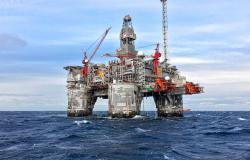All the evidence against the UK’s plans to expand oil and gas drilling

The UK will extract as much oil and gas from the North Sea as possible, Prime Minister Rishi Sunak said last week as he announced more than 100 new drilling licenses. Only a few days earlier, United Nations chief António Guterres declared that record heat and extreme weather signalled a new era of “global boiling” had arrived.
How many new oil and gas fields can the climate sustain? None says David Waltham, a professor of geophysics at Royal Holloway University of London who has spent 36 years training young geologists to work in the fossil fuel industry.
“We cannot safely set fire to all the fuel we’ve already found, so why look for more?” he asks.
This assessment is shared by the International Energy Agency (IEA), the UN and the Climate Change Committee (CCC) – the government’s own advisers on climate policy. Instead of expanding how much fossil fuel they extract, experts say countries must urgently reduce and even close down fossil fuel production.
An analysis of the world’s reserves in 2021 revealed how stark this decline must be to prevent catastrophic warming. Daniel Welsby, James Price and Steve Pye, the UCL energy researchers behind the research, said 60% of known oil and gas must remain underground in 2050 to prevent global temperatures exceeding 1.5°C above the pre-industrial average – the point at which damage to the climate is expected to rapidly become irreversible.
“Almost all of the world’s coal – 90% – will need to be spared from factory and power plant furnaces. Our analysis also showed that global oil and gas production must peak immediately and fall by 3% each year until mid-century,” they say.
The prime minister argued that pumping oil and gas in UK waters is at least greener than importing it from dirtier producers abroad. After all, the UK did create a climate compatibility checkpoint in 2021: six tests to assess how new fossil fuel projects might contribute to the emissions driving climate change.
“Only three tests remain,” say Tavis Potts and Daria Shapovalova, energy and development experts at the University of Aberdeen, “and each seems designed to wave through new rounds of oil and gas exploration and production.”
Fortunately, Sunak also promised to share £20 billion (US$25.4 billion) in public funding for carbon capture and storage technology with the Acorn project near Peterhead in Aberdeenshire, north-east Scotland. Historical research by Marc Hudson, a visiting fellow in science policy at the University of Sussex, shows how the future potential of this technology has been used to justify prolonging coal power and building gas power plants several times over the last two decades.
And evidence gathered by Nils Markusson indicates that hyping the promise of carbon capture and storage to offset rising emissions can actually delay necessary cuts to greenhouse gases. Markusson is a lecturer in environmental politics at Lancaster University.
What about energy security? Oil and gas from the North Sea is sold on the international market, so the UK’s licensing bonanza is unlikely to ease household energy bills. And the UK isn’t obliged to keep using oil and gas until 2050 as Sunak suggests. The CCC’s plan shows how the UK could meet all of its energy needs with low-carbon sources by mid-century.
The real cost of carbon
Is Sunak at least right in arguing that drilling for more fuel and doing it closer to home will make the UK safer in an era of growing political instability? Not according to Adi Imsirovic, a fellow in energy economics at the University of Surrey.
“The history of the oil and gas industry is a history of wars and geopolitical tensions,” he says. “Transitioning to cleaner fuels can only increase our energy security.”
Research by Imsirovic and others gives some idea of the consequences of the oil and gas industry’s zeal to pump more fossil fuel.
Economists estimate the cost to society of emitting an additional tonne of CO₂ between US$171 and US$310 (£133 to £241), he says.
“If we go with, say, US$240 per tonne, the social cost of continued carbon equivalent emissions comes out at almost US$8.5 trillion every year.”
But the effects of climate change aren’t so neat and self-contained. One problem caused by rising temperatures leads to others which ultimately accelerate the rate of warming, such as melting permafrost releasing heat-trapping methane gas. A study which attempted to include these feedback loops in calculations of economic damage put the social cost of releasing another tonne of CO₂ into the atmosphere at more than US$5,000.
“That implies annual costs of more like US$170 trillion a year, which makes the US$4 trillion investment into clean energy that the IEA thinks necessary to meet the Paris climate goals look like a drop in the ocean,” he says.
Would a new production boom in the North Sea at least benefit the UK’s public services through a flood of tax receipts? Because of loopholes in the government’s windfall tax on the North Sea industry, that’s not likely either says İrem Güçeri, associate professor of economics and public policy at the University of Oxford.
“There is a lot of research to show how to design a strong windfall tax that will bring in solid revenues for a government and its citizens,” Güçeri says.
The UK government doesn’t appear to have heeded it though, as it allows firms to reap a huge tax relief by investing profits into new extraction sites. “This is a massive subsidy,” she says.
“This is how some oil majors have avoided paying very much tax on their UK profits in recent quarters, despite massive gains.”
Jack Marley, Environment + Energy Editor, The Conversation
This article is republished from The Conversation under a Creative Commons license. Read the original article.
Photo by Jan-Rune Smenes Reite


